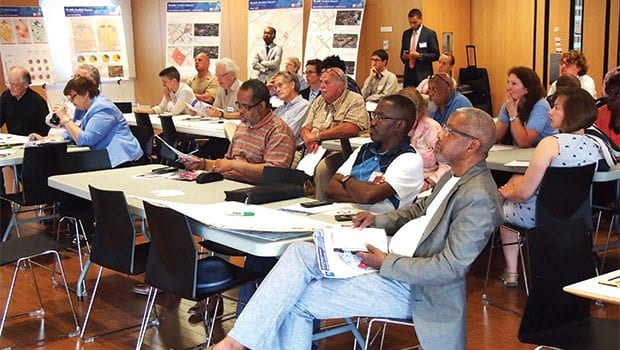Gentrification concerns dominate Dudley plan
Officials seek to balance development, displacement

The several dozen community activists gathered Monday at the Bruce Bolling Municipal Building to discuss the future of Dudley Square confronted a conundrum that has been vexing city planners across the United States: How to facilitate development in a neighborhood without displacing those already living there.
As the meeting got underway, the City’s Chief of Economic Development John Barros urged the participants to seize the opportunity to facilitate development in Dudley Square. There are four major parcels of vacant land the Boston Redevelopment Authority is hoping to put out to bid.

Roxbury Strategic Master Plan Oversight Committee member Charlotte Nelson and Dudley Main Streets Director Joyce Stanley listen to city officials’ presentations.
“My fear is that we’re in the third largest building boom in the 400-year history of this city and Roxbury is going to miss out,” he said.
Yet many of the residents who turned out for the BRA’s PLAN: Dudley meeting peppered Barros and the other city officials with questions about the impact future development in Dudley Square will have on rents in the surrounding neighborhoods.
“How do we make sure landlords don’t price us out?” one participant asked.
That question, along with others about access to jobs for local residents, turned out to be the crux of the conversation during the two hour meeting, held in the School Committee chamber.
While the median income in Roxbury is $35,000 for a family of four, the median income in the HUD statistical area is $94,000. The higher incomes of those outside Roxbury have made it difficult for local renters and prospective homeowners to remain in Roxbury.
Former City Councilor Chuck Turner was among those advocating for new jobs created on city-owned land to pay a minimum of $17 an hour — a wage that would provide workers Roxbury’s $35,000 median income.
“If not, why have development?” he argued. “Development drives up the cost of living.”
Barros and other city officials presented statistics on Roxbury residents they said would help guide discussions of neighborhood development plans. The largest portion of Roxbury residents – 23.7 percent – are employed in health care and social assistance, with large shares of the population also working in retail, hospitality and food services.
Trinh Nguyen, director of the Mayor’s Office of Workforce Development, described how her agency assisted 20,000 Boston residents obtain access to job and skills trainings. But her presentation was punctuated by pointed comments and questions. How many jobs has her office actually created? Why is the city conducting a study of hiring disparities when those disparities are already well-documented?
The at-times tense atmosphere in the room underscored what many expressed as deep concerns about gentrification and displacement in Roxbury as rising residential and commercial rents push out longtime residents and businesses.
“Development in Dudley Square could have a dramatically significant impact on Roxbury,” Turner said after the meeting. “The four major parcels due to be developed could stimulate a rise in rents that could make it difficult for people to remain in Roxbury. Fancy buildings and nice restaurants look good, but they’re a driving force behind gentrification of neighborhoods.”
The planning process includes vacant parcels of land in Dudley Square, along Melnea Cass Boulevard, Columbus Avenue and Bartlett Yard along Washington Street. Parcels currently under development in the area — Bartlett Yard, Parcel 3 and Parcel 9 — promise to bring 1,505 new housing units to the area. The undeveloped Dudley Square parcels, however, have been earmarked for economic development projects.
Roxbury Strategic Masterplan Oversight Committee member Charlotte Nelson said she agrees with requiring developers to commit to a $17 an hour minimum wage. But as for how to prevent the development in Dudley from causing displacement?
“Right now there is no answer,” she said. “The positive thing is people are expressing what they want for this area. People are hanging in with this planning process.”







